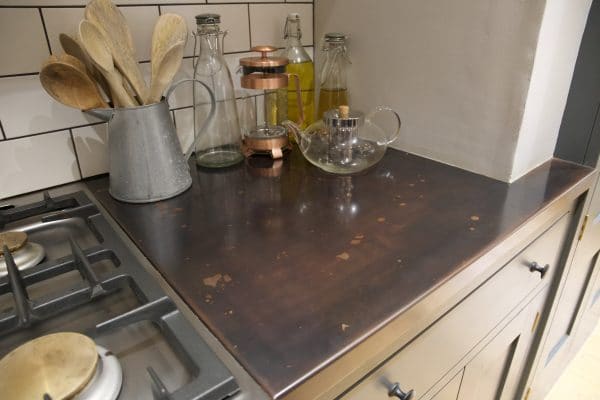Brass and copper worktops: pros and cons
When it comes to worktops, some of our most show-stopping kitchen designs are the White Shaker with Brass Worktop and the Antiqued Brass Contemporary Kitchen. As with a lot of statement designs, there are certain considerations to take into account when choosing which worktop you’d like in your kitchen. Here we analyse the pros and cons of brass and copper worktops.
With metal being such a popular choice for kitchen materials, it’s important to know not just the benefits, but also the potential drawbacks of each material. If you’re also considering a stainless steel worktop, you can read more about the pros and cons of stainless steel.
Copper kitchen worktop pros

You can be flexible with size
The first benefit of a copper kitchen worktop is that it can be to fit other elements of the kitchen. For example, copper worktops can be cut to size to enable you to situate your appliances wherever you like. You can go for an ultra-thin copper worktop or a thick-looking copper worktop, all the while making sure it’s completely bespoke to your kitchen’s overall look.
Copper worktops are antimicrobial and antibacterial
When it comes to cleanliness, copper kitchen units and copper worktops win out. It’s even been used in hospitals to prevent the spread of microbes. When you’ve got a busy kitchen with food splatters and kids getting messy, having a copper kitchen worktop better protects against germs.
Beautiful copper tones
Copper kitchen units have a natural warm glow, allowing you to get creative and incorporate different colours into your kitchen cabinets and accessories. While pairing a stainless steel worktop with an all-white run of cabinets might look a touch cold or sterile, copper worktops immediately balance out the crispness of a white palette.
Eco-friendly material
One of the many benefits of having copper worktops in your kitchen is that copper is one of the most eco-friendly metal worktops you could choose for your kitchen. It’s a sustainable material and if it ever needs to be replaced due to changing tastes, it’s completely recyclable.
Copper worktop cons

Copper is likely to develop a patina
This is somewhat subjective, as plenty of people love a weathered look.
As a natural and living material, copper often changes colour as it ages from wear and tear. This is true of most metals, although stainless steel is a notable exception. It’s good to know that the use of acidic liquids, such as lemon juice or vinegar, may cause stains on the surface. So keep this in mind if you are considering installing copper worktops in your kitchen.
Pictured above is our Bristol display kitchen with its copper worktops, which is in constant use. As you can see, our monthly team lunches have left their mark. We love having a little bit of history in our team kitchen, but it’s worth considering whether this would look good in your home.
Copper is a sensitive material
Some people complain that copper worktops are susceptible to scratches and dents. Again, this is down to personal preference: would your dream kitchen be pristine or rustic?
Brass Kitchen Worktop Pros

Brass worktops are low-maintenance
To keep a brass worktop clean, all you need is washing up liquid and a soft cloth or sponge. Any other cleaning agent may cause staining and help the patina to develop faster. For busy kitchens, this is a low-maintenance dream.
You won’t often see them elsewhere
Our clients come to us asking for a bespoke kitchen that won’t be copied and pasted into other homes. One of the reasons brass is popular is exactly that: it’s a real conversation starter. As a living surface, the appearance will change drastically so you’ll never see an identical copy.
Brass worktop cons

Brass worktops will also develop a patina
Like copper worktops, a patina will develop on a brass worktop over time. For this very reason, natural materials reign supreme in design philosophies all over the world (particularly in Japanese zen philosophy); though a changing surface isn’t necessarily to everyone’s taste.
Its sealant can nullify the antimicrobial properties
Sealant helps to keep a uniform look and prevent staining. However, this does neutralise the antimicrobial and antibacterial properties, which make it less hygienic.
Be careful with heat!
As you might expect, putting hot pans down on copper worktops or brass worktops is a surefire way to make the metal expand and warp.
Watch our video below of a cosy and classic shaker kitchen in the heart of Bristol, with its aged copper worktop giving the room a homely and warm glow.







